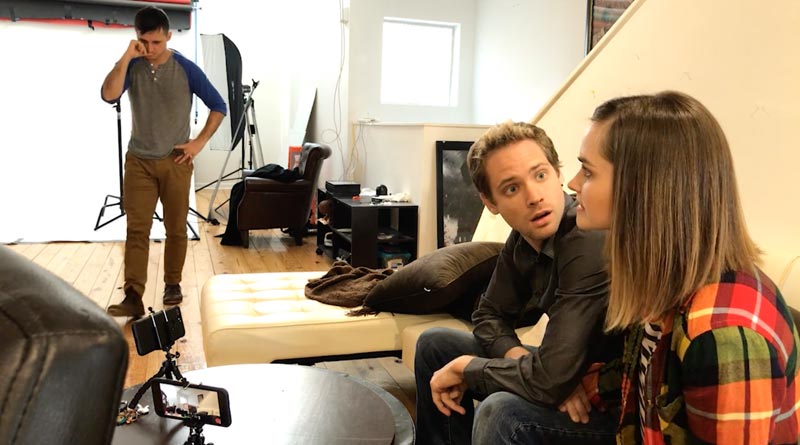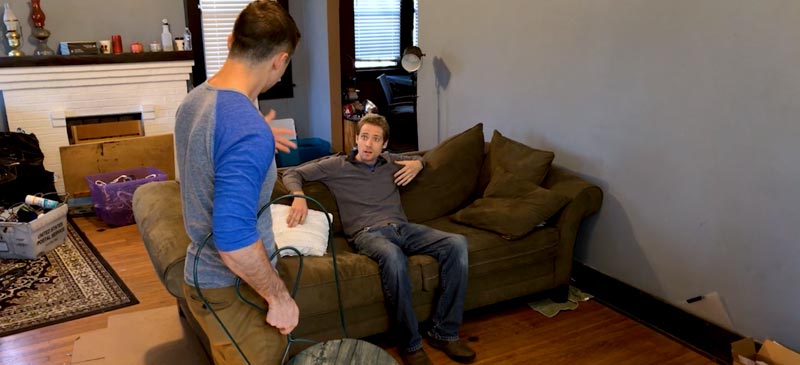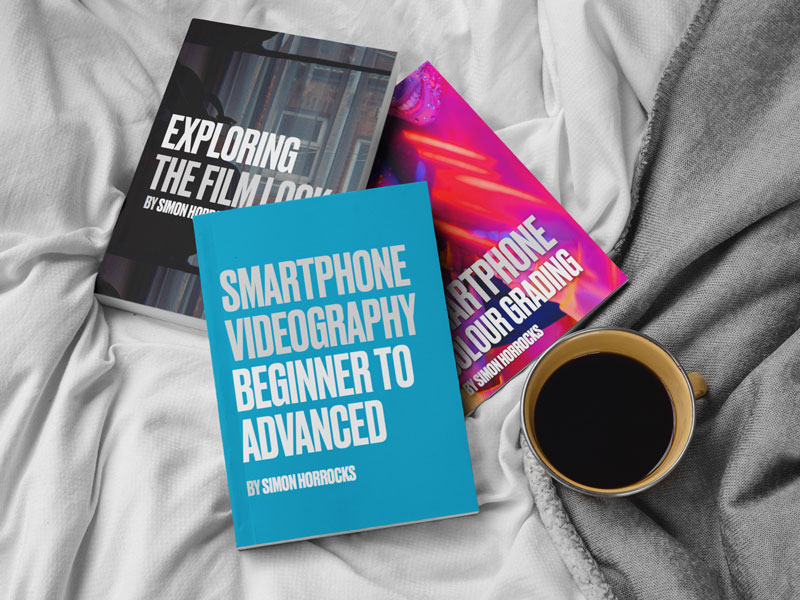Shot on iPhone 7+ PHONY – A Thought Provoking, Mind Twisting Feature Film
Personally, this wasn’t just one of the best smartphone films I watched last year but one of the best films, period. The film is a comedy full of surprises, and questions what is real and what is fiction in a world where everyone can now make themselves into a TV show. When we are all broadcasting ourselves constantly over social media, is there now any distinction between “real life” and movies and TV?
That’s what makes Phony so fresh. While our mainstream media continues to produce movies and TV as if we are still living in the 20th century, writer/director David Bush has made an iPhone-shot film about people filming themselves on iPhones. This is a reality we shouldn’t be able to ignore, but somehow we are.
So, we asked David to tell us more about his film…
What is the story behind your film?
I came up with the concept for Phony while I was in post-production on a movie that I had directed for a company that distributed through the Lifetime Network. That was my first feature and I was displeased with several creative constraints that I felt broadsided me during post-production.
In keeping with this angsty sort of dissatisfaction, I reread Salinger’s Catcher in the Rye, in which the word ‘phony’ is used incessantly, and somehow in my head it all came together. I knew that I wanted to have full creative control over my next feature film, and to do that I knew I would have to fund it myself. And I wanted to make a movie that looked at the dangers and pitfalls of having or losing that very control.
So, I figured why not make a pseudo-documentary, that could comment on its own lack of production value and then ultimately pull the rug out from under itself as well as its audience.
What were the steps which led you to make it?
Once I had the idea for the film, I spent a few weeks toying around with the concepts I wanted to play with and figuring out exactly how the movie-within-a-movie mechanism would work. Once I had an outline that made sense to me (and absolutely no one else), I locked myself away for a few days and hammered out the first draft.
Then to prevent myself from losing steam, I reached out to several industry friends, and pitched them the project. I was incredibly lucky that everyone I approached not only signed on but encouraged me to hurry up and shoot it immediately. So I bought 4 phones and wrote out a schedule and we got to work.
Why did you choose a smartphone to film with?
So many reasons. Firstly, it was affordable and easily justified within the framework of the story.
Second, the movie is very much about the fraudulence that modern technology allows and in fact encourages, and considering that this movie is itself very much a fraud, it seemed only appropriate that it should be created on the exact same devices that it was criticizing. The most acceptable hypocrisy I could imagine.
And finally, perhaps most importantly, I knew I wanted to call the movie Phony, and I’m an absolute pun addict.
What equipment did you use?
We shot with 4 x iPhone 7+s and used Filmic Pro to shoot, but otherwise no hardware.
The aversion to hardware (lenses etc.) was predicated on the fact that the movie was meant to look like it was shot on phones, and deliberately not have an over-cinematic feel, and also because the phones, when filming simultaneously, would be seeing each other in their shots, and the characters were not meant to look like they had the cinematic know-how to mount their phones on gimbals etc. Hell, their primary piece of technologically seems to be leaning the phones on pint glasses.
Our sound mixer recorded sound separately which we later synced on Adobe Premiere, which was our editorial platform.
How much did you know about filmmaking before you made this film?
A ton, and also, not nearly enough.
I’ve been a lifelong cinephile and had worked on more than 50 professional film and television shoots (primarily as an Assistant Director or Script Supervisor) prior to shooting this movie, so despite the amateurish approach of the characters in the film, and the tiny working crew, we did have proper call sheets and costume/art breakdowns etc. for the entire shooting schedule.
And… the minimal crew on set were all very well-trained in their respective professions, though used to much larger equipment packages and longer schedules than we had.
What did you like/not like about filming with a phone?
The only thing I didn’t like about it was my own paranoia about footage disappearing, unfounded paranoia, as this never actually happened.
Oh, actually, one complaint: at the time, Filmic Pro exported files with seemingly arbitrary file names and our Assistant Editor had to meticulously go through and figure out what was what. Otherwise, shooting with the phones was a dream.
Allowing the actors to do their own practical camera work was tremendous fun, for me and for them. Come to think of it, I suppose not having any way to monitor their work live was a minor inconvenience, but typically we (my DP and I) were able to squeeze in close enough to get a good idea of what they had gotten.
And we became experts at simultaneously clicking play on four phones to watch them play back in sync.
Has making the film changed your life in any way?
It has certainly made me aware that there’s no need to stop myself from pursuing creative ventures. The idea of shooting a feature with absolutely no funding was daunting, but the process was so smooth and painless, and I think my cast and crew would agree that it was one of the best shoots that any of us have ever been on.
How successful was the film, personally and in gaining an audience for your work?
This very much depends on the definition of ‘successful’. We finished it. So that’s huge. And I am extremely happy with the end result. We had a cast and crew screening and my sentiment was widely shared.
However, in the immediate aftermath of its completion, most of us became so bogged down with other film industry work that I’ve done very little to promote this movie. So hopefully the question of its success should not be in the past tense, but rather ‘how successful will it be?’
Looking back on the movie, is there anything you’d have done differently?
Not really. The prep and principal processes were so perfectly smooth and painless, which is largely a testament to the incredible cast and crew, that there’s very little I would change.
The final day of shooting was on my birthday, and I threw a wrap party for the cast and crew that night, a party at which I may have seriously over-indulged, resulting in a less than cheery next morning, but otherwise no, the experience was pretty perfect.
I suppose one thing I wish I’d done, is been a little more aggressive at maintaining the momentum to immediately push the project out into the world rather than letting it languish while I focused on other endeavors.
How important are film festivals that give these kind of films a platform for you?
Tremendously. I’ve always been a huge proponent of films pushing the boundaries and subverting societal expectations and structural norms. I think this sort of paradigm-challenge is more important than ever in encouraging people to be analytical in a world that has become increasingly polarized and where people are more and more expected to just align their beliefs with a political party or religious dogma.
The obstacle to making movies that are truly challenging is that they are difficult to market. So, to have venues like this festival that encourage people to think outside the box and to redefine what movies can, and perhaps should, be is, I think, of vast importance. And the fact that this particular one promotes a form of filmmaking that is more easily executable by anyone than any in history… amazing. So, thank you!
Smartphone Video – Beginner to Advanced
If you want to know more about smartphone filmmaking, my book Smartphone Videography – Beginners to Advanced is now available to download for members on Patreon. The book is 170 pages long and covers essential smartphone filmmaking topics:
Things like how to get the perfect exposure, when to use manual control, which codecs to use, HDR, how to use frame rates, lenses, shot types, stabilisation and much more. There’s also my Exploring the Film Look Guide as well as Smartphone Colour Grading.
Members can also access all 5 episodes of our smartphone shot Silent Eye series, with accompanying screenplays and making of podcasts. There’s other materials too and I will be adding more in the future.
If you want to join me there, follow this link.
Simon Horrocks
Simon Horrocks is a screenwriter & filmmaker. His debut feature THIRD CONTACT was shot on a consumer camcorder and premiered at the BFI IMAX in 2013. His shot-on-smartphones sci-fi series SILENT EYE featured on Amazon Prime. He now runs a popular Patreon page which offers online courses for beginners, customised tips and more: www.patreon.com/SilentEye





What an interesting read. I would love to see BTS videos.